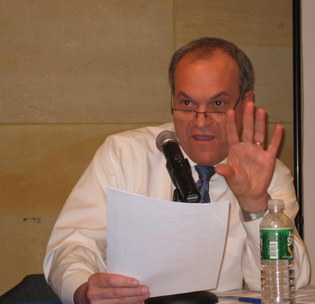 New Haven’s mayor said they’re “a short step” away as he squared off against his dramatic foil, Danbury’s immigration-battling mayor, at a forum in Hartford.
New Haven’s mayor said they’re “a short step” away as he squared off against his dramatic foil, Danbury’s immigration-battling mayor, at a forum in Hartford.
New Haven Mayor John DeStefano was describing a June 6 raid by ICE (Immigration and Customs Enforcement) officials of undocumented workers 36 hours after the city’s Board of Aldermen approved an immigration-friendly municipal ID plan. He made the suggestion at a debate Wednesday entitled “Illegal Immigration: How Cities Are Coping.”
DeStefano said many of those swept up were not named in the warrants ICE officials had obtained, including a mother who was held in jail in Maine for five months before being released. Her 12-year-old son submitted an affidavit that DeStefano referenced. He also mentioned transcripts of emails from ICE officers obtained through the Freedom of Information Act that referred to the upcoming raid as “going out to play.”
“Is that what we’re about?” he asked, “We play with people’s lives? That’s what we’re about as a nation? It’s a short step — why don’t we just take ‘em and waterboard ‘em.” Click here to hear more.
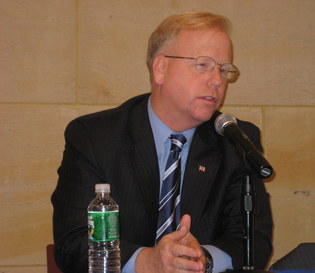 When Danbury Mayor Mark Boughton (pictured) said he thought the comparison was “over the top,” DeStefano shot back, “I guess it depends whether your mother was taken away for five months.”
When Danbury Mayor Mark Boughton (pictured) said he thought the comparison was “over the top,” DeStefano shot back, “I guess it depends whether your mother was taken away for five months.”
The waterboarding comment had elicited some groans from the audience of about 100 people. His rejoinder to Boughton, on the other hand, brought much applause from the seemingly immigrant-friendly crowd.
The two mayors have taken nationally noted, opposing positions on illegal immigration.
DeStefano defended his welcoming, inclusive approach, which he said has helped
increase safety and bring immigrants out of the shadows.
“I feel very empowered, and I think my community feels very empowered to make change,” he bellowed. He said that he thinks Americans are ready to be what they’ve always been, “which is a vibrant nation fueled by the optimism and energy of immigrants.”
Boughton has emphasized enforcement of immigration laws. He defended his decision to have city detectives trained to work with federal immigration officials to enforce the laws.
“Until the American people understand that we need to have workers, but we also need to have some sense of how enforcement works and we need to be serious about enforcement, then they’re never going to accept whatever gets proposed in Congress.”
The debate took place at the Mark Twain House, where several of author’s aphorisms are etched into the walls. One of them reads, “Travel is fatal to prejudice.” That suggested: If more Americans traveled to some of the home countries of immigrants well-represented in New Haven and Danbury — Mexico, Ecuador, Brazil — would they see the big picture differently?
That picture was painted by one of the audience members during the Q&A following the debate. They suggested it would be worthwhile to know how American trade and foreign policy have negatively impacted most of the hemisphere, forcing more people off their land and pushing them to “el Norte “to find work.
A Conservative Pro-Immigrant Voice
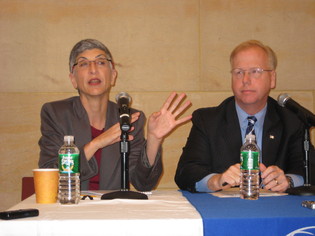 A third panelist was Tamar Jacoby of the Manhattan Institute (pictured), described in the evening’s program as “a leading conservative voice…in favor of immigration reform.”
A third panelist was Tamar Jacoby of the Manhattan Institute (pictured), described in the evening’s program as “a leading conservative voice…in favor of immigration reform.”
When it was her turn to speak, she emphasized that the immigration system is “completely broken,” because the U.S. economy needs many more workers than its native-born or legal immigrant population can provide. She said there are merits in both mayors’ approaches, and emphasized the need to increase legal immigration so the U.S. could get “the busboys and gardeners” it needs for the economy to prosper.
The mild-mannered Boughton seemed squeezed, literally, sitting between the more forceful DeStefano and Jacoby, who marshaled studies to show that undocumented immigrants contribute more to the growth of the economy than they consume in services. Boughton relied more on anecdotal information, like a landscaper who told him he had to sell his business because he was being undercut by competitors using undocumented laborers.
In competing op-eds in Sunday’s Hartford Courant (a co-sponsor of the event, with the World Affairs Council), Boughton and DeStefano laid out their views. (Read them here and here.) Perhaps for the first time, DeStefano made the case for a guest worker program, which has been opposed by most immigration advocates in previous bills as akin to slave labor and offering no path to citizenship. At the debate, Boughton criticized that proposal on those grounds.
Asked about it before the debate, DeStefano said, “I think any resolution is going to involve border security, a guest worker program and a pathway to citizenship for these residents of ours. So I think those are going to be the three legs of any solution.”
He was asked if he was distinguishing between those already here, who can become citizens, and those who would like to come into the country — who would become the guest workers. “I think part of a solution for the 12-15 million who are here is to get them into a guest worker program, probably first, and then transition them to a pathway to citizenship, in a Congressional compromise,” he said.
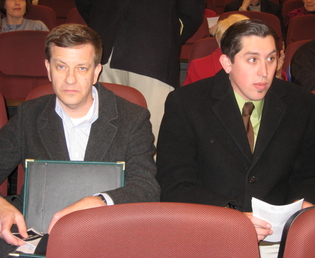 During the debate, DeStefano noted that a member of the Community Watchdog Project (Dustin Gold, pictured on the right) was videotaping him. DeStefano condemned what he called the racist and divisive tactics of such anti-immigrant groups. He said their tactics fall into a long, sordid history of racism in immigration policy against different nationalities over the past century and a half. Gold’s organization has maintained it opposes only illegal immigration.
During the debate, DeStefano noted that a member of the Community Watchdog Project (Dustin Gold, pictured on the right) was videotaping him. DeStefano condemned what he called the racist and divisive tactics of such anti-immigrant groups. He said their tactics fall into a long, sordid history of racism in immigration policy against different nationalities over the past century and a half. Gold’s organization has maintained it opposes only illegal immigration.
Throughout the debate, Boughton put more stock in the power of technology (like building virtual fences along the borders) to solve the immigration stalemate. DeStefano insisted it’s a matter of political will.
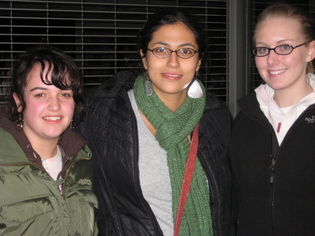 Farmington High School art teacher and immigrant advocate Marelas Zacarias came early and brought two of her students to hear the debate. Zacarias in general supports DeStefano’s position, though she was unhappy to hear of his call for a guest worker program, which she strongly opposes.
Farmington High School art teacher and immigrant advocate Marelas Zacarias came early and brought two of her students to hear the debate. Zacarias in general supports DeStefano’s position, though she was unhappy to hear of his call for a guest worker program, which she strongly opposes.
Michelle Gothers (on the right in photo, with Zacarias in the middle and fellow FHS junior Chelsea LaPorte on the left) said she had been opposed to illegal immigrants being in the country, but after she heard “Ms. Zac’s” arguments, she said she was open to learning more. She called the current system “one where you’re guaranteed to fail.” Click here to hear more.
The event was sponsored by the World Affairs Council and the Courant.